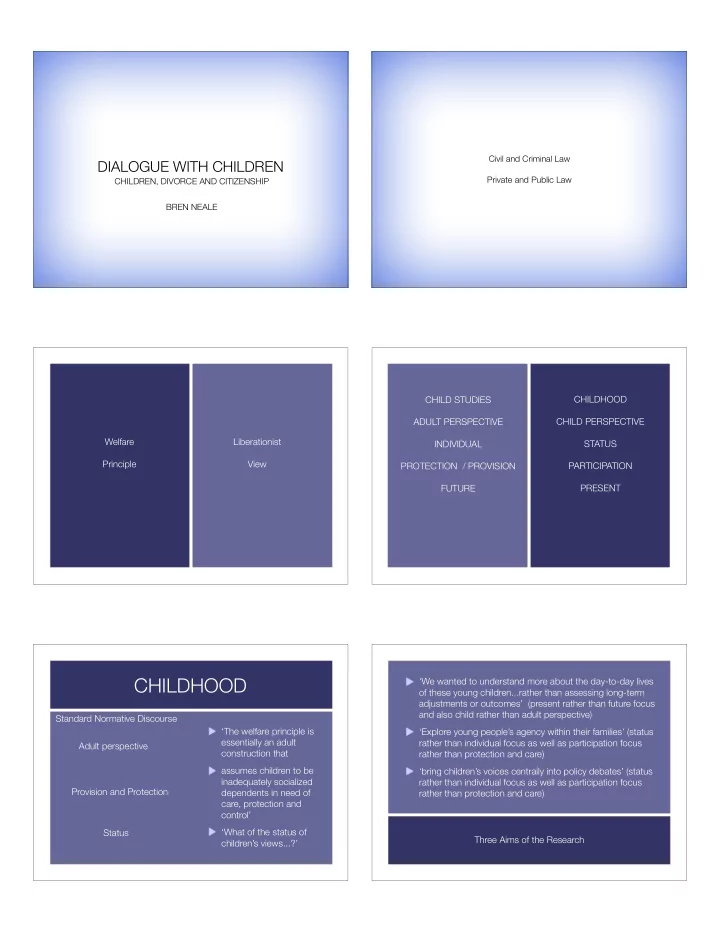

Civil and Criminal Law DIALOGUE WITH CHILDREN Private and Public Law CHILDREN, DIVORCE AND CITIZENSHIP BREN NEALE CHILD STUDIES CHILDHOOD ADULT PERSPECTIVE CHILD PERSPECTIVE Welfare Liberationist INDIVIDUAL STATUS Principle View PROTECTION / PROVISION PARTICIPATION PRESENT FUTURE CHILDHOOD ‘We wanted to understand more about the day-to-day lives of these young children...rather than assessing long-term adjustments or outcomes’ (present rather than future focus and also child rather than adult perspective) Standard Normative Discourse ‘The welfare principle is ‘Explore young people’s agency within their families’ (status essentially an adult rather than individual focus as well as participation focus Adult perspective construction that rather than protection and care) assumes children to be ‘bring children’s voices centrally into policy debates’ (status inadequately socialized rather than individual focus as well as participation focus Provision and Protection dependents in need of rather than protection and care) care, protection and control’ Status ‘What of the status of Three Aims of the Research children’s views...?’
Welfare Principle express wishes and feeling Object Subject Agent Coagent RHETORIC Response Private adults decide whether to RESTRUCTURE listen to children Restructure Private adults decide whether to RESPONSE take into account what children tell them Rhetoric Public Private In terms of agenticity the legal system in England scores ambivalent 16.1 (1) A person under fourteen years of age is (5) If the court is satisfied that there is an issue as to the presumed to have the capacity to testify. capacity of a proposed witness under fourteen years of age to No oath or solemn affirmation understand and respond to questions, it shall, before (2) A proposed witness under fourteen years of age permitting them to give evidence, conduct an inquiry to determine whether they are able to understand and respond shall not take an oath or make a solemn affirmation to questions. despite a provision of any Act that requires an oath Promise to tell truth or a solemn affirmation. (6) The court shall, before permitting a proposed witness Evidence shall be received under fourteen years of age to give evidence, require them to (3) The evidence of a proposed witness under promise to tell the truth. fourteen years of age shall be received if they are Understanding of promise able to understand and respond to questions. (7) No proposed witness under fourteen years of age shall Burden as to capacity of witness be asked any questions regarding their understanding of the nature of the promise to tell the truth for the purpose of (4) A party who challenges the capacity of a determining whether their evidence shall be received by the proposed witness under fourteen years of age has the court. burden of satisfying the court that there is an issue Effect as to the capacity of the proposed witness to (8) For greater certainty, if the evidence of a witness under understand and respond to questions. fourteen years of age is received by the court, it shall have Court inquiry the same effect as if it were taken under oath. 1 2005, c. 32, s. 27. 1 Private/Civil Law Arguments for child participation • legal discourse and welfare principle • dependency construction • limits child participation • welfarist version challenge family integrity but also can • family integrity (familiarization of childhood) be used to argue children harmed by involvement in • best interest vs stated wishes and preference decision making - both adult centric • rights based arguments - children and competent and • mothers in the 50s and 60s and parents later on often misrepresented by adults • collection and use of information • both blur participation and choice • ignore specificity of childhood and ignore children’s perspectives
Bren’s article can be read as a comparison of English legal institution and the family in terms of Social Citizenship Model agenticity Acknowledge specificity with the law coming across as ambivalent and characterized by hierarchical adult-child relations Acknowledge child competence and provision and protection features of the SND Acknowledge stated wishes and preferences while the family is seen as facilitative and Minimizes adult - child power struggle characterized an emphasis on participation through negotiation What conditions must exist to allow this to happen? Interpretative Overview
Recommend
More recommend